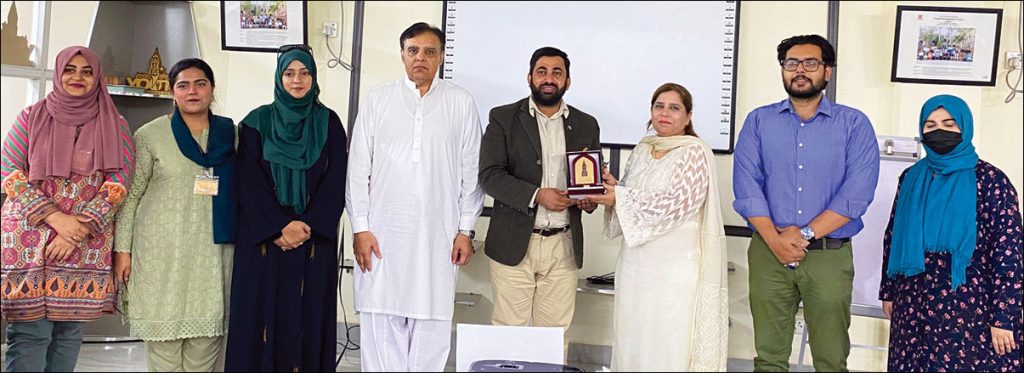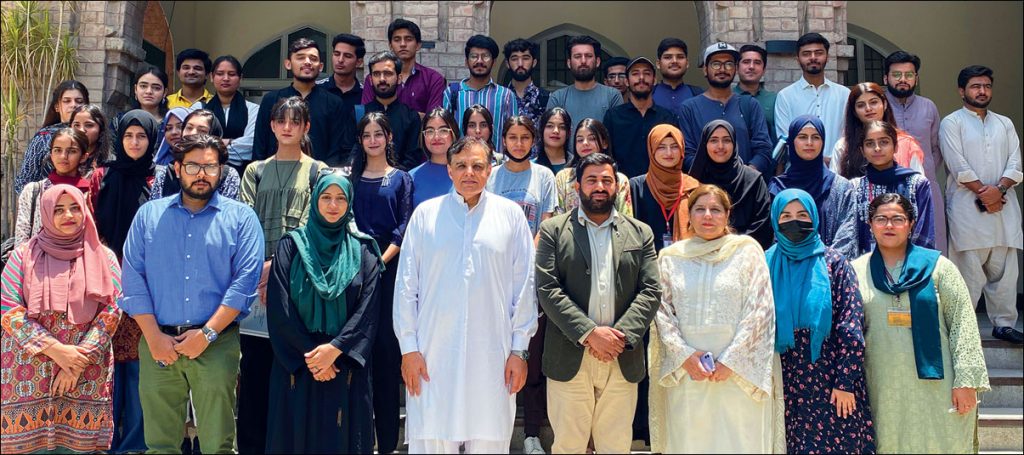Adherence to reporting guidelines will minimize harm and
provide support to vulnerable populations
Workshop on Media and Suicide reporting
LAHORE: A workshop titled “Media and Suicide: Role of Reporting Guidelines in Suicide Prevention” was recently organized at Government College University Lahore by Faculty of Psychiatry, King Edward Medical University, Connections Psychiatric Services & FMH in collaboration with Institute of Media and Communication Studies, GCU, and Youth Development Center GCU. The objective was to address the significant impact media coverage can have on suicide rates.

Prof. Mukhtar, Director, Institute of Media and Communication Studies, Government College University presenting a memento to Prof. Nazish Imran during the Workshop on Media Reporting and Suicide.
Prof. Mukhtar, Director, Institute of Media and Communication Studies, Government College University welcomed the guests and explained the objectives of the workshop and importance of the topic. The Facilitators of the workshop included Prof Dr Nazish Imran, Prof Imran Ijaz Haider and Dr Maryam Ayub. Experts discussed how responsible journalism can serve as a preventive measure, while sensationalized or inappropriate reporting can contribute to a rise in suicide cases. The workshop emphasized the importance of adhering to established reporting guidelines, which are designed to minimize harm and provide support to vulnerable populations. Participants explored case studies and best practices, highlighting the media’s role in fostering public awareness and understanding of mental health issues. The event underscored the media’s potential to act as a powerful ally in suicide prevention when reporting is handled with care and sensitivity.
Prof. Nazish explained the high-risk populations of suicidal behavior and limited data from adults and adolescents which is available from Pakistan and South Asia. Dr Maryam explained various local newspaper practices in suicide reporting and their contrast with WHO guidelines for suicide reporting. Prof Imran Ijaz highlighted social media reporting and new recommendations to be considered while reporting suicides online and in digital media. It was highlighted that the need for responsible reporting of suicides on social media is critical due to the platform’s vast reach and influence. Social media can rapidly disseminate information, making it essential to handle such sensitive topics with care to prevent potential harm. Inappropriate or sensationalized reporting of suicides can lead to contagion effects, where exposure to such content may increase the likelihood of vulnerable individuals attempting suicide.

Prof Dr Mukhtar, Director, Institute of Media and Communication Studies, Government College University; Prof Dr Nazish Imran, KEMU; Prof Imran Ijaz Haider, Connections Psychiatric Services, Dr Maryam Ayub, FMH, along with faculty members photographed alongwith the participants of the workshop on Media Reporting and Suicide held recently.
To mitigate these risks, social media platforms and users should adhere to established reporting guidelines that emphasize the importance of not providing detailed descriptions of the methods used, avoiding sensational headlines, and focusing on the impact of suicide on the community and the availability of support resources. Including information on mental health resources and encouraging those in distress to seek help can also play a vital role in suicide prevention. Responsible reporting on social media not only respects the dignity of the deceased and their families but also contributes to a more informed and supportive online community. This approach can help reduce the stigma around mental health issues and promote a culture of empathy and understanding. Towards the end mental health of journalists was highlighted by facilitators and it was explained how journalists can manage their own mental health while dealing with traumatic news reporting.
He mentioned that Journalists covering traumatic events often face significant emotional and psychological challenges, making it crucial for them to prioritize their own mental health. Reporting on distressing incidents like natural disasters, violent crimes, suicides or conflicts can lead to vicarious trauma and burnout. To mitigate these effects, news organizations are increasingly providing mental health resources and training for their staff. Journalists are encouraged to seek professional support, practice self-care, and maintain a healthy work-life balance. Peer support groups within the industry also play a vital role in helping reporters cope with the emotional toll of their work. By taking these steps, journalists can safeguard their well-being while continuing to perform their crucial role in informing the public. Various group activities were conducted so students can implement new guidelines in newspaper report. Students and faculty participated with a lot of zeal and enthusiasm and gave excellent feedback.
Report by Prof Dr Nazish Imran, Prof Imran Ijaz Haider & Dr Maryam Ayub.



